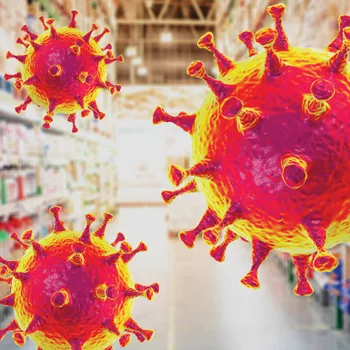Food Supply Chains and COVID-19: Impacts

This has certainly been a year of great impacts on food supply chains. When we first discussed a Food Safety Insights article about supply chain issues, the focus of the article was intended to review supply chain management and control, supplier verification, the Foreign Supplier Verification Program, and similar topics.
As with most every subject these days, however, what we heard in our survey and interviews was dominated by concerns brought on by the impact of coronavirus disease (COVID-19). The short-term impacts are being felt in every area of food processing, but the longer-term impacts are just now beginning to be examined and understood. How are processors coping with the shortages and supply chain disruptions they are facing today, and what are they considering as permanent changes for the future?
The immediate short-term impacts of the pandemic have caused significant disruptions in all aspects of processors’ supply chains. But what do processors see as their largest problems?
In our survey of 240 processors and subsequent interviews, four major areas dominated their concerns: availability of raw materials, transportation and delays, operating supplies, and prices.
Getting the raw materials they need to produce their product was the clear number one concern (Figure 1). The processors’ concerns were certainly about the shortages of critical raw materials and getting what they need on time and in sufficient volume. But due to the other complications that come with severe material shortages, they also reported significant concerns and negative experiences regarding product quality—not only the quality of products available but particularly the quality of potential product substitutes as well. 
One pet food supplier we spoke with mentioned the difficulties they had in sourcing their basic raw materials. They receive meat and rendered material from slaughterhouses, yet the well-publicized shortages this past summer at slaughterhouses had a significant impact on their ingredient supply. This was further exacerbated by the lack of demand from foodservice and fast-food restaurants, which caused a dramatic drop in demand for eggs. It has been well-documented that this caused many eggs to be destroyed, and chicks were culled early in the shutdown. But the reduction in the number of chickens also meant a lack of incoming supply for this pet food manufacturer. And all this occurred at a time when demand for their pet food was rising.
Shortages of supply caused many companies to see more issues with product quality than they had in the past. The reason, we heard, was that in the face of shortages, their immediate and secondary suppliers needed to rely on riskier and lower-quality sources to try to meet demand. Several companies mentioned that this resulted in their finding more noncompliant material being delivered. One company said that they were finding “more spices with higher lead content,” while two others said they were seeing “higher pesticide residues” and “more foreign materials.”
These concerns regarding the volume of supplies available and the ability to supply product that met their specs were evident throughout our survey. With the ongoing shortages, many recognized the high risk of nonconforming substitutions. But they had a higher recognition of the risk of compromising their quality standards. The plant operations manager at a ready-to-eat (RTE) meat company told us, “We will never use products that do not meet our specs or affect our product label claims. It is not something that would be tolerated by any of our end customers and, even if it were, it is not something that we, as a company, would do.”
Another category of concern involved transportation and delays. Some delays were due to COVID-related complexities affecting infrastructure. Several companies mentioned that they were seeing significant delays due to the “closing of ports owing to COVID” because of either the availability of labor to work at the ports or import/export restrictions implemented by local jurisdictions. One ingredient company mentioned that “outbound logistics to all parts of the EU” have been difficult.
A pet food company representative with whom we spoke mentioned that their logistics had been significantly impacted by the availability of drivers. Not only was there frequently a shortage of trucks (due to delays and bottlenecks) but also a significant lack of drivers. We were told that many of the more experienced drivers with whom they worked were older, and, as such, many declined to drive, especially to and from hot spots. Also, due to quarantine rules, having drivers quarantine after they crossed state lines or went to and from hot spots further reduced the number of drivers available.
A company in the margarine and oils business reported that their business was up significantly due to a higher level of home cooking. They reported that keeping up with their raw material supply to support the additional production was not their main difficulty. Like the pet food company, they had transportation issues, especially with their outbound shipments being delayed by a driver shortage. They faced a further complication in cases where their customers were responsible for pickups in that the pickups were not being completed on time, causing delays in those and other deliveries and an overall backup in their shipping operations.
Transportation issues caused another concern about quality that was mentioned multiple times—product temperature control. Concerns were voiced about maintaining product temperature during delays at ports, in customs, in distribution centers, and when crossing country, province, or state borders, especially when crossing to or from COVID hot spots.
Another critical supply issue identified was obtaining operating supplies, those nonraw materials needed for production, such as food contact packaging materials and nonfood contact materials such as personal protective equipment, gloves, face masks, hairnets, hand soap and sanitizers, cleaning chemicals, sanitizers, and similar essential materials.
As with their product raw materials, processors also reported concerns not only about the volume of these supplies but also with their quality, especially those coming from secondary suppliers or substitutes.
An ingredient company told us that they had concerns, but they were careful with compromise. “We had trouble at times with our primary food packaging supply, but we did not make any substitutes with any of our food contact materials. This often meant that all of our lines had to run slower, but we were able to keep all of the lines running and without any compromise in our product quality.”
This concern did not stop just with materials but was also an issue with service suppliers. In many cases, especially early on in the pandemic, service suppliers were just as overwhelmed as their processor customers with shifting demands and priorities, and having the material and labor to keep up. And since services are supplied by individuals who are at risk of contracting—or spreading—COVID-19, travel and in-plant visit restrictions added to the difficulties of service calls. One large lab company told us, “We have been having difficulty getting the qualified service technicians from our authorized service providers of critical lab equipment to be able to travel to our sites.”
The fourth-most-mentioned difficulty was pricing. While this will be disconcerting to many readers, it certainly should not be surprising that in the face of shortages, prices will rise. And many companies reported seeing very significant increases in their supply prices.
One company that manufactures RTE smoked meats mentioned that not only was the meat that they needed in short supply but also that the pricing for those products went “rocket high,” according to the plant manager. “We saw price increases to as much as twice what we were paying prepandemic.”
As we discussed previously about the shortages in transportation, those shortages had a similar impact on transport costs that was also recognized by our survey respondents. “We are seeing significant increases in transportation costs…our fuel prices are surging,” reported one processor. One Central American processed food company reported significant increases in their “ocean freight costs.”
The increases in raw material pricing also brought along another concern—food fraud. With the market being short of raw materials, and the pricing being an incentive for less transparent suppliers and brokers to get involved, many companies voiced their concern for a higher risk of food fraud.
With the higher risk, many processors felt the need to make changes. For some—28 percent of U.S./Canadian processors and 38 percent of international—this meant increased inspections or testing (Figure 2). “We increased our level of inspections on all inbound materials,” one plant manager told us.

A quality assurance/quality control manager from an ingredient company echoed these thoughts and said the potential for fraud was their number one issue, but they took a different set of preventive measures, reporting, “We had shortages and issues with our raw materials supply. But our concern for fraud kept us from shopping for new suppliers. We made it a policy to avoid brokers at all costs, and we have been able to say that we have had zero percent of our supply come from brokers all throughout this time.”
All the concerns outlined in this Food Safety Insights are hopefully short term and behind us sooner rather than later. These impacts, however, have caused food processors to question the soundness of their long-term supply chain strategies. Do the cost savings of just-in-time processing justify the long-term risks? Should supply chain strategies include more redundancies? What other measures are being considered?
These issues will be examined in our next Food Safety Insights in the December 2020/January 2021 issue.
Bob Ferguson is president of Strategic Consulting Inc. is president of Strategic Consulting Inc.
Looking for quick answers on food safety topics?
Try Ask FSM, our new smart AI search tool.
Ask FSM →









